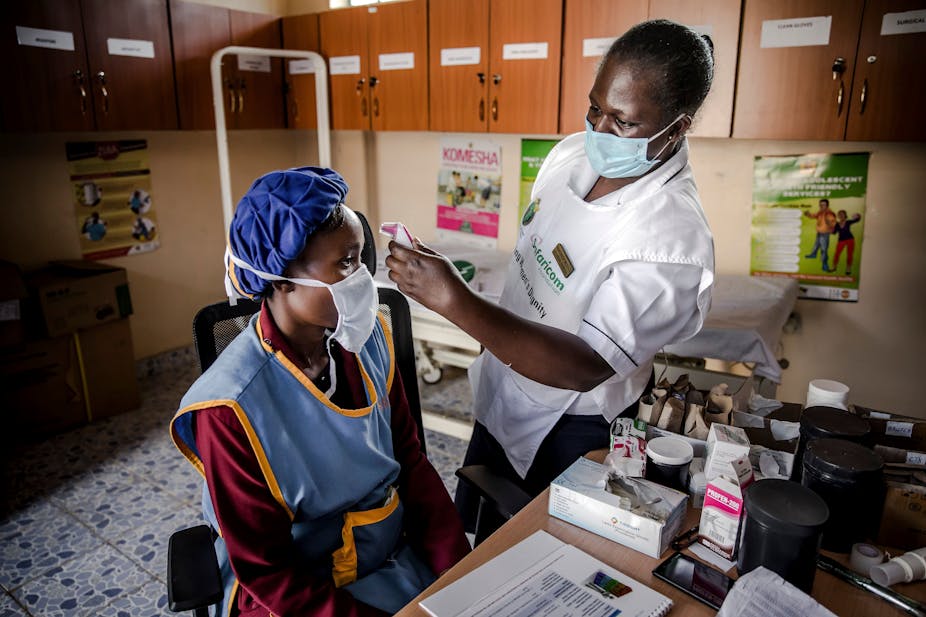
COVID-19 and its grave impact worldwide has emphasised just how critical it is for African countries to develop their healthcare systems. For the most part, these systems are woefully underfunded and understaffed.
It will take many different approaches to repair these systems. Given my area of expertise and my research focus, I am interested in the role that Artificial Intelligence (AI) might play in bolstering the continent’s health systems.
AI embodies the field of knowledge that seeks to create machines (computers) that can emulate human cognitive functions such as learning, reasoning, understanding, vision, perception, recognition, and problem solving to a reasonable level. Computers that have AI capabilities are currently being used in several real-world domains to solve problems.
We know that AI can be used effectively in healthcare. Since 1972, when the first AI system for medicine, known as MYCIN, was created, more sophisticated systems have evolved. Today AI technologies are used to help detect and treat diseases; predict the growth of the disease, and help doctors to make better decisions. With the rise of mobile technologies like phones and tablets, even in rural areas, AI’s potential for use in rural healthcare is growing.
In previous studies I conducted with some of my colleagues, we explored how to apply this potential while considering ethical and practical issues. Two of the studies focused on disease diagnosis and treatment. Two others considered how AI might be used to monitor and improve people’s adherence to medication regimens.
So, how could the lessons from my research and from existing AI healthcare initiatives be applied during the current fight against COVID-19?
Some AI applications
For starters, I must make clear that I’m not suggesting AI is the silver bullet that will solve all of the continent’s healthcare issues. Instead, AI initiatives should be developed in conjunction with spending on infrastructure and training. AI can supplement the efforts of available medical personnel – and help keep them safe.
AI has already played a significant role in each stage of fighting the COVID-19 pandemic. Some areas where we saw immediate applications include the processing of large amounts of data to find patterns that could lead to the discovery of potential treatment drugs; as well as treating infected people.
In China, robots were used to test and treat COVID-19 patients while healthcare workers stood at a safe distance to minimise the risk of infection. The analysis of large volumes of medical records data using AI allowed Taiwan to identify people at a high risk of COVID-19 infection; they were then contacted and advised about how to lower that risk.
In the US, self-driving bus shuttles have been used to transport COVID-19 tests from one point to another to protect healthcare workers from infection and to enable them to use more of their time to attend to patients’ direct treatment needs.
Some other types of AI technologies have already been deployed as part of the global response to COVID-19. These range from tracking the movement of people to curb transmission through contact by seeking to know who they have been with, and not just where they have been, to the development of an AI-powered database that will help enable researchers to quickly discover literature resources that are related to coronavirus and its cure.
As shown in the Chinese example, computer systems or robots can be used to screen people for COVID-19. This will reduce the risk of medical professionals being infected, which is important given that they are at high risk of infection. In rural contexts, this is especially key: these areas are already battling with staff shortages and having medical staff fall ill leaves the areas more vulnerable.
Other options that could be considered for rural African contexts include simple AI systems that can respond when a sick person sends a text message or a voice note from a mobile phone describing their symptoms. The response might be what kind of drugs to take, or where to find help in their area.
Ethical considerations
There are ethical concerns when using any AI technology. Issues of accountability (who takes the liability/credit), privacy and protection of personal information, informed consent, trust, and social implications are important when using AI for healthcare.
It will not be enough for African countries to merely roll out AI systems. They must also each develop an ethical framework that will guide the use of these systems, both as they relate to COVID-19 and more broadly.
The framework must be contextual and should stipulate when, where, and how AI systems should be deployed for healthcare to ensure ethical and responsible usage.
Also, there must be new laws and policies to regulate the use of AI in healthcare, similar to those that are already in place or in development in the EU, US, and Singapore. This will provide the legal backing and framework that is needed to cater for lawsuits that may arise from the use of AI systems.
All of this will lay the much-needed foundation for the adoption of AI for healthcare in Africa, and particularly for rural healthcare. It will also help prepare for future exigencies in the mode of COVID-19.![]()
Justine Olawande Daramola, Prof, Cape Peninsula University of Technology
This article is republished from The Conversation under a Creative Commons license.

